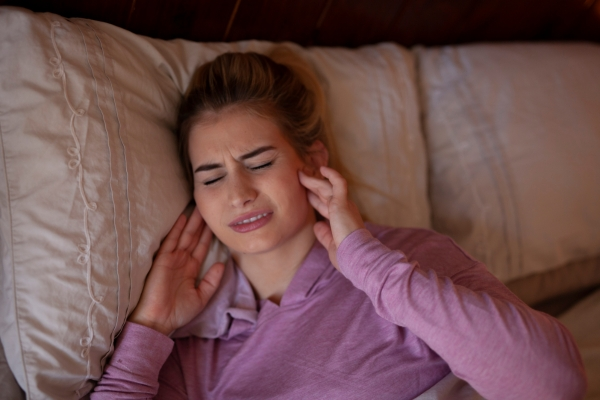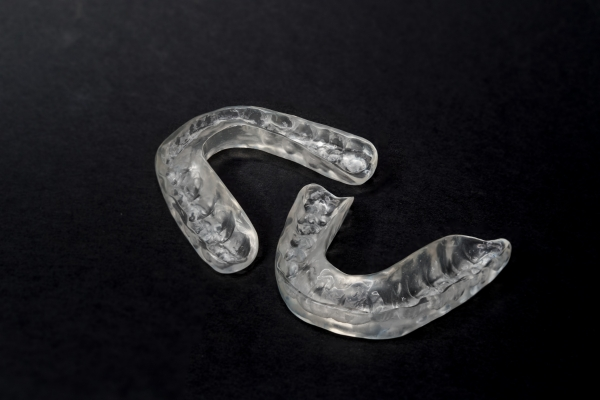Have you ever woken up with a sore jaw or a headache? It could be because you’re grinding your teeth while you sleep, a common problem known as bruxism. This habit can mess up your oral health and overall well-being without you even knowing. But don’t worry, nightguards can help. These handy gadgets are more than just a chunk of plastic; they act like a comfy cushion for your teeth, protecting them from the damage caused by grinding. Are you ready to find out why a nightguard might become your new best friend at night? Let’s get started!
What are Nightguards and How Can They Help?

Defining Nightguards
Nightguards are typically made from strong plastic and are designed to fit perfectly over your teeth. They’re available in several types, from custom-made ones crafted by dental experts to the easier boil-and-bite options that you can adjust at home, as well as ready-to-wear versions from the store. But no matter the type, they all have the same key job: to protect your teeth while you sleep.
How Nightguards Function:
The main job of a nightguard is to act as a protective barrier. It keeps your upper and lower teeth from touching, shielding them from the damage caused by teeth grinding. Clenching your jaw or grinding your teeth puts a lot of pressure on your teeth, which can wear them down, make them sensitive, and even cause them to crack or chip. A nightguard helps spread out this pressure more evenly, reducing the impact on any individual tooth.
What is Bruxism and Its Symptoms

As mentioned earlier, ,bruxism is when you clench or grind your teeth without realizing it. This can happen during the day or more often while you’re asleep. While it might not seem like a big deal, if you keep it up, bruxism can cause quite a few dental and health problems.
- Teeth Grinding or Clenching: This is the main sign of bruxism. Often, people don’t know they’re doing it until someone else hears the grinding at night or they start having other problems. The noise from grinding can range from hardly there to so loud that it wakes you or someone else up.
- Damage to Teeth: If you grind a lot, your teeth can get flattened, cracked, chipped, or even become loose. Grinding puts a lot of stress on your teeth, wearing them down and sometimes breaking them. This kind of damage can get so bad that you might need dental work like crowns, bridges, root canals, or even tooth extractions.
- Increased Tooth Sensitivity: As you wear down the enamel, or the outer coating of your teeth, they can become more sensitive. This might make it painful or uncomfortable to eat or drink hot, cold, or sweet things.
- Jaw Discomfort and Pain: Bruxism doesn’t just mess with your teeth; it also puts strain on your jaw muscles and joints. This can feel like pain or soreness in your jaw, neck, or face and can lead to a condition called TMJ disorders, which affects how your jaw moves.
- Headaches and Earaches: The constant strain from grinding can also cause headaches, typically around the temples. Sometimes, the pain feels like it’s coming from your ear, but it’s actually from your jaw because they’re so close to each other.
- Sleep Disruption: The sound of teeth grinding can be loud enough to disturb your sleep or that of your partner. The discomfort from grinding might also make it hard to sleep well, which can leave you feeling tired and worn out.
Dealing with bruxism is important not just for your teeth, but for your overall health and comfort. If any of this sounds familiar, it might be a good idea to talk to your dentist about how to protect your teeth and get a better night’s rest.
How Bruxism Impacts Your TMJ:
TMJ disorders impact the joint that links your jaw to your skull, crucial for everyday activities like talking, chewing, and yawning. Regular teeth grinding, known as bruxism, puts a lot of stress on this joint, often leading to TMJ disorders. The symptoms of these disorders include jaw pain, clicking or popping sounds when you move your mouth, headaches, and sometimes even a jaw that locks in place. Frequent bruxism not only makes these symptoms worse but can also change how your teeth line up, adding even more stress to the TMJ.
Compounding Oral Health Issues:
The constant pressure and friction from teeth grinding can wear down your enamel which is the protective outer layer of your teeth. This thinning of enamel increases tooth sensitivity and makes you more prone to cavities. The intense force from grinding can also cause tiny cracks or even significant fractures in your teeth, threatening their structural integrity. Over time, this damage may require extensive dental treatments like fillings, crowns, or root canals to fix the appearance and function of your teeth.
Preventive Measures and Treatment:
Addressing bruxism and associated TMJ disorders early can significantly reduce their impact on oral health. This is why dentists often recommend using nightguards, which not only protect the teeth from grinding damage but also lessen the strain on the TMJ by providing a physical barrier between the upper and lower teeth. Additionally, managing stress, improving sleep habits, and employing muscle relaxation techniques can help diminish the frequency and intensity of teeth grinding.
Benefits of Nightguards and how they help with Bruxism:
If you’re wondering can nightguards fix bruxism or can nightguards fix teeth grinding then we’re going to answer those questions in the simplest way possible by listing down how nightguards can help.
| Benefit | How It Works |
|---|---|
| Protects Teeth | Prevents teeth from grinding against each other, which can lead to wear, cracks, or chips. |
| Reduces Jaw Strain | Distributes the pressure from jaw clenching, reducing the risk of TMJ disorders and jaw pain. |
| Improves Sleep Quality | Minimizes discomfort from grinding and clenching, leading to a more restful and peaceful sleep. |
| Saves Money | Protecting your teeth from damage can reduce costly dental repairs in the future. |
| Prevents Headaches | Reduces the frequency and intensity of grinding-related headaches by lessening muscle tension. |
Choosing the Right Nightguard
When it comes to protecting your teeth from the effects of grinding, not all nightguards are created equal. Picking the right one can make a big difference in how well you sleep and how comfortable your jaw feels in the morning. Let’s break down what to consider when choosing a nightguard, why you should talk to your dentist about it, and the upsides and downsides of custom versus store-bought options.
How Much do Nightguards Cost?
If you’re wondering how much do nightguards cost then we’ll break it down for you:
- Over-the-Counter (OTC) Nightguards: Typically range from $15 to $70.
- Dentist-Made Nightguards: Typically range from $200 to $800 or more.
What to Look For in a Nightguard:
- Material: Nightguards are usually made from various types of plastics or acrylics. Some materials are softer and offer more comfort, while others are harder and provide stronger resistance against severe grinding. Your choice will depend on how severe your grinding is and what feels best in your mouth.
- Fit: This is probably the most crucial factor. A good fit not only feels more comfortable but also works better at preventing grinding. If a nightguard doesn’t fit well, it can slip during the night, cause irritation, or even worsen your grinding.
- Comfort: Since you’ll be wearing the nightguard all night, it has to be comfortable. It shouldn’t irritate your gums, trigger your gag reflex, or feel bulky in your mouth. Comfort can often be subjective, so what works for one person might not work for another.
Consulting with a Dental Professional:
Talking to your dentist is essential when you’re considering a nightguard. They can assess the severity of your bruxism and help you choose the right type of nightguard. If you have recently completed your clear aligner treatment then you can also get a custom nightguard from the same brand. Plus, they can take precise measurements to ensure that your nightguard fits perfectly.
Custom-Fitted vs. Store-Bought Nightguards:

- Custom-Fitted: These are made just for you by your dentist. They take an impression of your teeth and create a nightguard that matches your mouth exactly. The big plus is that these provide the best fit and are usually more comfortable and effective. The downside? They can be pretty pricier compared to off-the-shelf options.However, customized nightguards deliver better results.
- Store-Bought: These include boil-and-bite models that you soften in hot water and then bite into to form a shape somewhat customized to your teeth. There are also one-size-fits-all nightguards that don’t require any molding. The main advantage here is cost; they’re more affordable than custom options. However, they’re usually not as comfortable or well-fitting as custom nightguards and might not last as long.
Care and Maintenance of Nightguards
Keeping your nightguard clean and stored correctly is key to making sure it lasts and continues to protect your teeth effectively. Here’s how to do it right:
- Cleaning: Rinse your nightguard with water after each use. For a deeper clean, brush it gently with a toothbrush and mild soap. Avoid using hot water or harsh cleaners, as they can warp the material.
- Storing: Keep your nightguard in a ventilated case when not in use. This prevents moisture buildup, which can lead to bacteria growth.
- Common Mistakes: Don’t leave your nightguard in direct sunlight or in hot places like a car dashboard, as heat can deform it.
- When to Replace: If you notice cracks, tears, or significant wear, it’s time to replace your nightguard. Also, if it starts to fit poorly or becomes uncomfortable, see your dentist for a new one.
Final Thoughts
Nightguards play a crucial role in maintaining oral health, especially for those prone to grinding their teeth at night. By preventing teeth grinding, nightguards help safeguard your smile from wear and tear, reduce the risk of TMJ disorders, and even improve sleep quality by easing jaw tension. They are an effective, non-invasive solution for many people suffering from bruxism.
FAQs
1. Can wearing a nightguard straighten my teeth like braces?
No, a nightguard is designed to protect your teeth from grinding and does not have the capability to align or straighten teeth like orthodontic braces do.
2. Are nightguards comfortable to wear?
Yes, when properly fitted, nightguards are comfortable to wear. Custom-fitted nightguards, made by dentists, offer the best comfort and effectiveness.
3. How long does a typical nightguard last?
The lifespan of a nightguard varies depending on the material and how severe your grinding is, but typically they can last anywhere from 2 to 5 years with proper care.
4. Can children wear nightguards?
Yes, children can wear nightguards, especially if they grind their teeth at night. However, it’s important to consult a dentist to get a nightguard that fits properly and is safe for a child.
